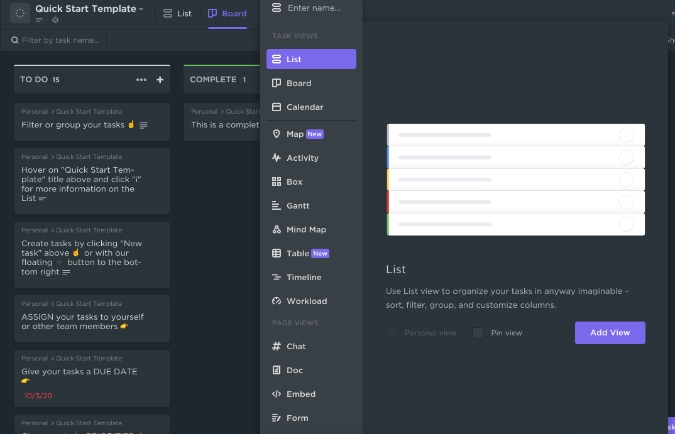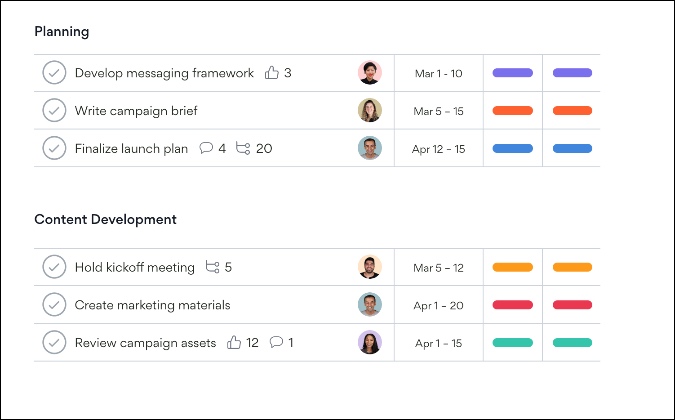The COVID-19 situation has redefined the typical workspace in organizations. We no longer have access to conference rooms to discuss ideas and potential projects. This is especially true for marketing departments as you need to get in touch with colleagues and juniors to brainstorm the latest trends and how to create hype around the next product launch. It’s a headache to keep everyone in sync without capable project management software. Here, we have listed the five best project management tools for marketing in 2021.
Project Management Tools for Marketing
The needs of a marketing department vary from company to company. That’s why we will be focusing on software that offers effortless organization for employees that’s scalable. Let’s get started.
1. Hive
User interface plays a major role in any project management software. After all, not everyone is familiar with the software in the first place. Hive has nailed the fundamentals here.

During sign up, you can add company details, your marketing department details such as project name, number of employees, and invite them to the project. I appreciate the cloud storage integration in the group chat so that you users can easily add files from OneDrive or Google Drive.
As for tasks, you can add all details such as description, timer, tag a member, and attach files.
Pros:
- Different layouts from Kanban-style to Gantt, Calendar, label view, and team view
- Live project status on the home
- Bunch of templates to choose from
- Rich third-party apps integration
Cons:
- Mobile apps leave a lot to desire
- Web-only on desktop
Price
$12 per member per month
Visit Hive
2. Notion
Notion is more of a personal database tool but it excels at project management capabilities as well. Over the years, the company has added many project management features to make teams function better.

The combination of modular approach and feature-rich templates makes Notion one of the best software to manage marketing tasks. Everything is a block, just drag and drop away. Notion relies on built-in as well as community-made templates to create a suitable workplace.
Notion recently added a timeline view that’s a blessing for anyone handling major product launches and taking care of every little marketing detail day by day.
Pros
- Perfectly suitable for personal as well as professional use
- Easy to understand and get started
- Huge collection of templates
Cons
- Web-wrapped mobile apps
- Sluggish performance while loading data-heavy pages
Price
$8 per member per month.
Visit Notion
3. Monday.com
While using monday.com, two features stand out for me. Intuitive UI and a number of features that go along with any type of marketing campaign in this project management tool.

One can create as many boards for a project and invite members to manage work. For example, the marketing head of the company can divide the entire project and product launch in different cities. From each board, he has to invite the local employees to the board and start assigning tasks to them.
I love the Live Status function of the app. It’s color-coded and you can see the live progress right from the home page. As always, you can choose from different board views and choose the layout that fits your project.
Pros
- Rich integration center
- Automation support similar to IFTTT
- Apps marketplace for enhanced functionality
- Excellent mobile apps
Cons
- UX can be confusing sometimes
Price
$8 per member per month.
Visit Monday.com
4. ClickUp
ClickUp takes a conventional approach for navigation. The organization tries to mimic how a traditional marketing department operates. You can create a workspace and add different sections based on cities, multiple projects, etc.

ClickUp has the best collection of project management templates. There are over 124 to choose from and they are all designed with project management in mind.
The data import options are endless. You can successfully move tasks from third-party apps such as Basecamp, monday.com, Wrike, Todoist, and of course, Trello and Asana.
ClickUp offers a killer feature called Dashboard. Using a centralized dashboard, you can add chats, checklists, embeds, and integrate as widgets to create your control center.
Pros
- Excellent project management features
- High-quality templates
- Native mobile apps
Cons
- Busy User Interface
Price
$5 per member per month.
Visit Clickup
5. Asana
How can I end the list without mentioned Asana? Created by Facebook co-founder Dustin Moskovitz, Asana is basically Trello on steroids. During my research, I have come across many marketing departments using Asana to manage product launches and creating strategies for a successful marketing campaign.

The popular project management tool nails down when it comes to organizing every essential detail in one place. Unlike other apps, you don’t need to jump through dozens of sections to glance at project details.
Asana allows you to add the project description right at the home. One can create as many templates as he likes and each template severs a different purpose. For example, using a timeline template you can see the marketing efforts throughout the product launch date and assign relevant tasks to team members accordingly.
Pros
- Hundreds of templates to choose from
- Rules function – Basically Asana’s take on IFTTT (If This Then That)
- Decluttered home page
- The free version is feature-rich
Cons
- Expensive compared to rivals
Price
$11 per member per month.
Visit Asana
Wrap Up: Project Management Tools for Marketing Campaigns
In 2021, you no longer need dozens of team meetings to run an effective marketing campaign. Start using the apps above, explore each one’s potential, opt for third-party apps integration and make a striking impact with one of the best marketing campaigns.